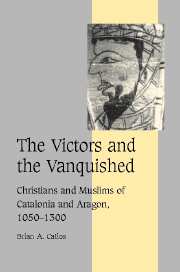Book contents
- Frontmatter
- Contents
- List of figures
- List of maps
- List of tables
- Acknowledgments
- Note on the citation of sources, dates, places, and names
- Glossary
- List of abbreviations
- INTRODUCTION
- Part I Muslim domination of the Ebro and its demise, 700–1200
- Part II Muslims under Christian rule
- Part III INDIVIDUAL AND COMMUNITY IN THE CHRISTIAN EBRO
- INTRODUCTION
- CASE STUDY 1: FISCAL AND CONFESSIONAL IDENTITY: THE GALIPS, TEMPLAR VASSALS IN ZARAGOZA (1179–1390)
- CASE STUDY 2: FRANQUITAS AND FACTIONALISM IN DAROCA: THE LUÇERA FAMILY VS. THE ALJAMA (1267–1302)
- CASE STUDY 3: LITIGATION AND COMPETITION WITHIN THE MUSLIM COMMUNITY: THE ABDELLAS OF DAROCA (1280–1310)
- CASE STUDY 4: ADMINISTRATIVE CORRUPTION AND ROYAL COMPLICITY: ABRAHIM ABENGENTOR, ÇAUALQUEM OF HUESCA (1260–1304)
- CASE STUDY 5: OVERLAPPING AGENDAS: THE CAREER OF MAHOMET, ALAMINUS OF BORJA (1276–1302)
- CASE STUDY 6: THE GOOD, THE BAD, AND THE INDIFFERENT: CHRISTIAN OFFICIALS IN THE EBRO REGION
- PERSONAL HISTORIES: THE INDIVIDUAL, WITHIN THE COMMUNITY AND BEYOND
- Conclusions
- Appendices
- Select bibliography
- Index
- Cambridge Studies in Medieval Life and Thought Fourth series
CASE STUDY 6: THE GOOD, THE BAD, AND THE INDIFFERENT: CHRISTIAN OFFICIALS IN THE EBRO REGION
Published online by Cambridge University Press: 08 January 2010
- Frontmatter
- Contents
- List of figures
- List of maps
- List of tables
- Acknowledgments
- Note on the citation of sources, dates, places, and names
- Glossary
- List of abbreviations
- INTRODUCTION
- Part I Muslim domination of the Ebro and its demise, 700–1200
- Part II Muslims under Christian rule
- Part III INDIVIDUAL AND COMMUNITY IN THE CHRISTIAN EBRO
- INTRODUCTION
- CASE STUDY 1: FISCAL AND CONFESSIONAL IDENTITY: THE GALIPS, TEMPLAR VASSALS IN ZARAGOZA (1179–1390)
- CASE STUDY 2: FRANQUITAS AND FACTIONALISM IN DAROCA: THE LUÇERA FAMILY VS. THE ALJAMA (1267–1302)
- CASE STUDY 3: LITIGATION AND COMPETITION WITHIN THE MUSLIM COMMUNITY: THE ABDELLAS OF DAROCA (1280–1310)
- CASE STUDY 4: ADMINISTRATIVE CORRUPTION AND ROYAL COMPLICITY: ABRAHIM ABENGENTOR, ÇAUALQUEM OF HUESCA (1260–1304)
- CASE STUDY 5: OVERLAPPING AGENDAS: THE CAREER OF MAHOMET, ALAMINUS OF BORJA (1276–1302)
- CASE STUDY 6: THE GOOD, THE BAD, AND THE INDIFFERENT: CHRISTIAN OFFICIALS IN THE EBRO REGION
- PERSONAL HISTORIES: THE INDIVIDUAL, WITHIN THE COMMUNITY AND BEYOND
- Conclusions
- Appendices
- Select bibliography
- Index
- Cambridge Studies in Medieval Life and Thought Fourth series
Summary
The stresses and tensions which developed in aljamas did not necessarily result from the subordinate status of Muslim fiscal and judicial administration of the Crown, but were a consequence of the “normal” dynamic of government, and thus the behavior of mudéjar officials did not differ significantly from that of their Christian and Jewish counterparts. When their official and private acts are cataloged, it emerges that these officials did not act according to communal biases, but rather in response to their own interests. Like their Muslim colleagues, they constituted a hinge between Christian, power and local mudéjar collectives, and through their position as intermediaries bridged the three confessional communities of the Crown. In this final section, the careers of four typical Christian officials are examined in terms of their interaction with their subjects of the Crown's three ethno-religious groups.
BARTHOLOMEUS THOMASII, BAIULUS AND MERINUS OF ZARAGOZA (1276–1283)
Many officials, particularly those who functioned in a variety of administrative offices simultaneously, had jurisdictions which included Muslim, Christian, and Jewish communities. Such was the case with Bartholomeus Thomasii, who for eight years was one of the most powerful figures of royal tax and judicial administration in the Ebro–Jalón region. His influence can be traced back to 1276, when he was appointed baiulus of Zaragoza, in charge of a wide province including Alfamen, Almonacid de la Cuba, La Almunia de Doña Godina, Cetina, Daroca, Embid de la Rivera, and Huesca, and his letter of commission commanded all of the royal subjects (homines) of these places to respond to his jurisdiction alone.
- Type
- Chapter
- Information
- The Victors and the VanquishedChristians and Muslims of Catalonia and Aragon, 1050–1300, pp. 373 - 388Publisher: Cambridge University PressPrint publication year: 2004



